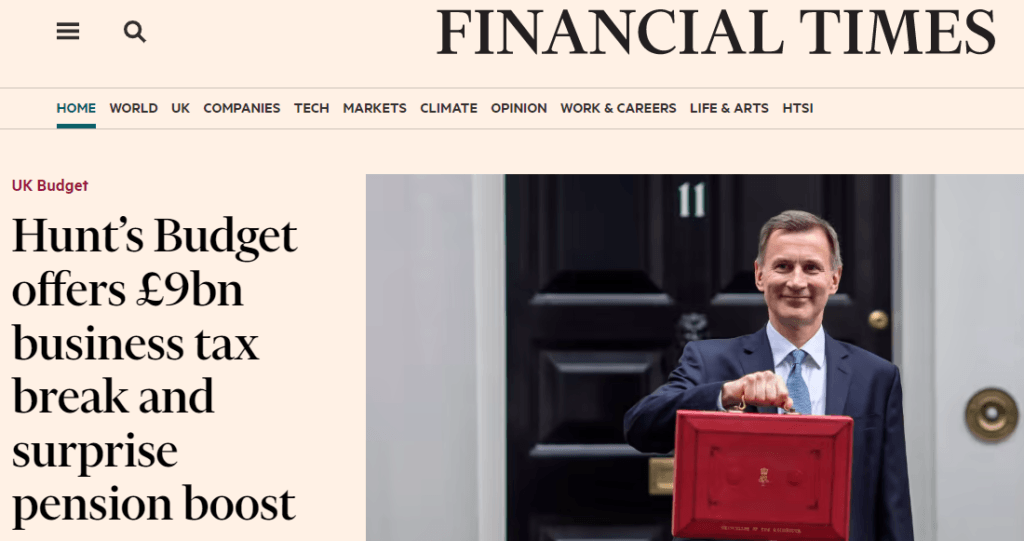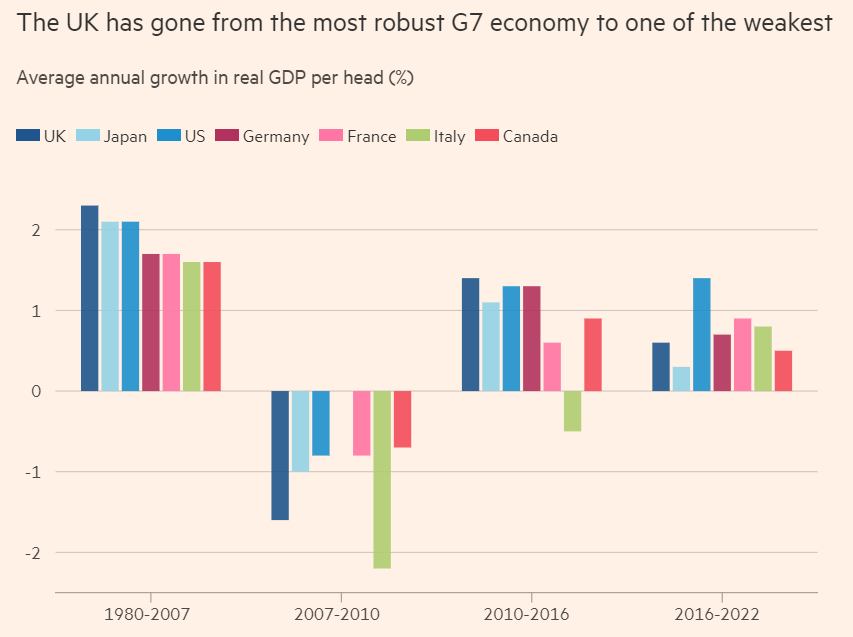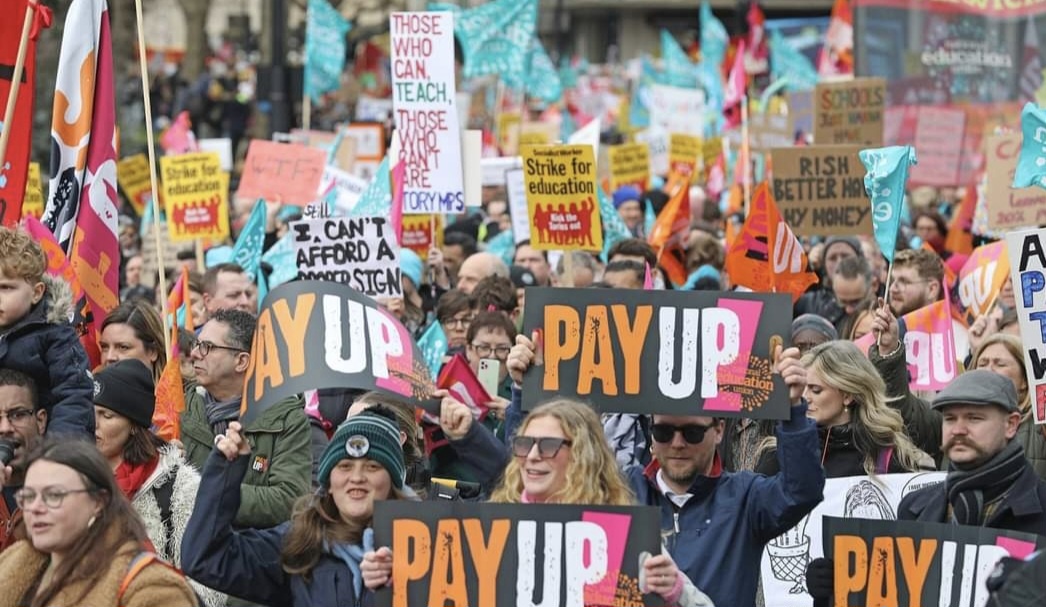Hundreds of thousands of workers took strike action on Wednesday, Budget Day. Protesting against the relentless erosion of their living standards, strikers included rail workers, civil servants, teachers, university lecturers and other public sector workers. Even BBC staff from local radio stations were on strike.
Although it went largely unreported, there was a huge march through London, the European (but not British) media noting that it stretched from Marble Arch to Piccadilly, a distance of nearly two miles. While workers in their millions are suffering the biggest hit in their living standards in generations – and that is why so many are fighting back – yesterday’s Tory budget offered only more taxation for workers and hand-outs to business and the rich.
No-one expected anything useful for the working class from Chancellor, Jeremy Hunt. And so it proved. Indeed, the only consistent element in the strategy of this government is an unrelenting drive to lower living standards, by keeping wage levels below inflation and cutting to the bone all those services upon which workers depend.

The headline message in the Financial Times budget report (inset, left) said it all: a give-away budget for business, amounting to tens of billions, while crumbs are scattered for a relatively small number of workers, crumbs that are more than paid for by higher income taxes. It is as if the real world outside the House of Commons is a foreign country to the Tories.
The Resolution Foundation’s Living Standards Outlook
In that real world, workers and their families are facing the deepest cuts in living standards in a century. The Financial Times noted on Monday that “In the three months to January, UK annual wage growth was stuck at 5.7%, nearly half the level of inflation, down from 6% in the previous three months”.
The Resolution Foundation, an authoritative think-tank, issued a report on living standards in January. In their Living Standards Outlook, they noted that “2022 was a disaster for UK living standards. As inflation reached its highest level in 41 years…But real pay still shrunk, and government support was not enough to prevent median household incomes from falling by 3 per cent in 2022-23”.
Three quarters of UK adults were cutting back on spending towards the end of last year. While Rishi Sunak has had an upgrade made to his neighbourhood electricity grid so he can heat his swimming pool, millions of families are finding it difficult to heat their living rooms. Workers who are struggling to pay energy bills have been forced onto pre-payment meters, giving them a choice of either paying more for their energy or going without.

The Foundation also found that almost twenty per cent, or ten million people, “are not confident about their finances as a whole over the next few months”. For the poorest workers, “this rises to 32 per cent, and to 43 per cent for those not working and on benefits”. Towards the end of last year, more than a quarter of all adults said they could not afford to eat balanced meals and six million adults “reported being hungry in the past month because they lacked enough money to buy food”.
Biggest items in poor households have higher inflation
The worst-off workers are young workers, the lowest paid, including many women workers, those in the gig economy and those who rely on benefits to get by. The headline rate of inflation – over 10% – does not account for the fact that the less well-off pay a greater the proportion of income in food, energy and housing, all items where inflation is well into double figures.
Meanwhile, the top five per cent of the population, according to the Foundation, will see a rise in their net income, as a result of rising interest rates and investment income. For the UK, the ‘Gini’ inequality coefficient is projected to reach over 40% by 2028, which is a record.
The Living Standards Outlook is a sombre read for anyone wanting to gauge the well-being of most of the population. It reads like a modern version of Engels’ famous book, The Conditions of the Working Class in 1844. It is a catalogue of harm: indebtedness, inability to pay for rent or utilities, insecurity, uncertainty and worry about the future of families and their children. It takes a toll on relationships, on mental and physical health, and on education.
It is worth noting, that whereas in the past it was mostly the very lowest paid sections of workers who suffered squeezes in living standards, now many more highly-skilled and relatively well paid workers are struggling to keep up. The Daily Telegraph, a Tory rag if ever there was one, flew the flag for the ‘middle-classes’ in an article last month, (February 8). Commenting on a report from the National Institute of Economic and Social Research (NIESR), it reported the middle class “will still experience a significant hit to their living standards this year”. “The middle classes” it says, “will be nearly £4,000 worse off”.
This same Telegraph, the media and the BBC devote so much time on trivia like the royals, celebrities’ lives and diversions like asylum seekers in dinghies precisely to draw attention away from this economic disaster. Speaking at a rally against the Tories’ disgraceful immigration bill, Matt Wrack, the General Secretary of the Fire Brigades Union, hit the nail on the head. “This Bill”, he said, “will not add a penny to healthcare, or build a single flat or home, or fund a single hospital.” Much the same is true of Jeremy Hunt’s budget and it is notable that Hunt did not make one single mention of public sector pay or the crisis in public services
Pensions changes affect only a tiny number of the very well off
Coming to the budget itself, the two main changes headlined in the press: a relaxation of pension rules and ‘support’ for child-care, will make very little difference to the lives of most workers.
Changes to pension taxation mean the limit on the total amount that workers can accumulate in their pension ‘pot’ before additional tax has been lifted. But the previous limit – £1m in a lifetime – is well beyond what most workers would accumulate anyway. As one pensions consultancy told the BBC, “the government’s plans to raise pension tax allowances will benefit relatively few workers”.

It is a measure only aimed at extremely well-off pensioners and particularly well-heeled consultants who, although trained by the NHS, do lucrative private work. As a result of the marginal rate of taxation on their pensions, too many consultants are retiring early.
The budget will do nothing to bring back into the workforce all of those over-50s who are currently not working. Why indeed should semi-retired workers who have worked all their lives, and who often have valuable skills and experience, go back to working for a miserly minimum wage, which is all they would be offered? In fact, according to ONS figures, the trend among those classed as ‘economically inactive’ is actually down, as poorer, semi-retired workers are forced back to work by rising costs.
The other item flagged up in the press is the supposed ‘support’ for child-care costs. But as even the Financial Times expert pointed out the package as a whole will not come into operation for two and a half years. Meanwhile, nurseries and child-care centres are closing and cannot find staff. “This government’s gross neglect and chronic underfunding of the early years sector”, the correspondent writes, “means it will take years before women truly benefit from these changes”.
It is also a strange kind of childcare ‘support’ that only applies in term time – so that when nurseries and creches are closed, parents are presumably going to have to provide fourteen weeks of very expensive care for themselves.
Even the Confederation of British Industry have estimated that to be worthwhile childcare support should cost at least twice the £4bn the government is putting in over several years. Wealthy consultants might be getting a pension boost, but nothing in the budget supports childcare workers, overwhelmingly women, who are among the lowest paid.
Household energy bills are twice as high as a year ago.
As for maintaining the current energy cap, for which we are all supposed to feel grateful, it is not so much a subsidy to households, as a hand-out to the big energy giants. It is a government a subsidy to profiteers. All of the big energy companies are making record profits, and even though world gas prices have fallen to former levels, household bills are still twice as high as they were a year ago and are still expected to go higher when this ‘subsidy’ ends.

In distinction to these petty crumbs thrown in the general direction of workers, billions are being given to business. Tax write-downs for investments will alone cost more than twice the money pledged for childcare. An additional £10bn for defence spending means large guaranteed profits for a handful of big arms and equipment manufacturers for years to come.
All of which – with taxation at record peace-time levels – will be largely paid for by increased income tax paid by working people. A measure that was introduce earlier, and goes unchanged in this budget, is the freezing of income tax thresholds for the next five years. This means that as workers see their wages edge upwards, they will be paying a greater effective rate of income tax, bringing in tens billions from those least able to afford it.
This Tory government operates policy solely in the interests of the rich and super-rich. It punishes the poor on benefits while it lets industrial-scale tax-dodging go unattended. It demonises workers who fight to keep wages rises up with price rises, while it turns a blind eye to the massive profiteering of the energy companies.
UK has worst growth expectations in G7
But what also needs to be understood – and unfortunately it is not understood by the Labour leadership particularly – is that the economic system itself faces a profound crisis. British capitalism has gone from one of the most buoyant and robust economies to the sickest of the main capitalist countries. The International Monetary Fund has forecast that the UK economy will be the worst-performing of the seven main capitalist (G7) economies this year.

According to the Financial Times (March 14), “Average annual growth rates have more than halved since the global financial crisis of 2007-08. The UK economy is no bigger now than it was on the eve of the coronavirus pandemic at the end of 2019 and the Bank of England does not expect to recover that ground until 2026 at the earliest”.
“If the UK’s gross domestic product per person had grown as rapidly in the 15 years after 2007 as it did in the 27 years since 1980, every person in the UK would be £10,600 or 31 per cent a year better off in real terms…according to IMF data”.
The Tories are in denial about the baleful effects of Brexit on the UK economy. According to the deputy director of one think-tank quoted in the Financial Times, “these [Brexit] effects and more had cost the UK economy 5.5 per cent of GDP by the summer of 2022”. The Bank of England has also admitted that “these [Brexit] effects might have occurred more quickly than previously assumed”.
As well they might well be, defending a system whose political representatives they are, the Tories above all are in denial about the depth of the crisis of British capitalism. Using what the Financial Times describes as “judiciously selected” statistics, Hunt feigns optimism about the economy, and cheered on by the buffoons on the Tory back benches in parliament, condemns what he calls “declinism”. Yet that is precisely the only policy the Tories have: having workers pay for a “managed decline”.
Unfortunately, all of those around Keir Starmer at the top of the Labour Party, are suffering from the delusion that the only thing British capitalism needs is more ‘efficient’ management, a ‘plan’ as Starmer trots out over and over. But it is the system itself that is incapable of change for the better and it is the fundamentals of the economic system that Labour should be addressing.

If Labour wanted to seriously make a difference to the lives of the big majority of the population, it should take as its starting point the strikes and marches on Budget Day. Labour’s banner should read ‘No Cuts In Living Standards!’
Wages should be linked to living costs! There should be a national minimum wage of at least £15 an hour! Child-care costs should be borne by big employers, for all of their workers, with full state provision where this is not possible! There should be controls on rents so workers can afford to live!
Labour should link these, and similar demands, to a policy that challenges the system on which the economic runs. If the ‘market’ system is so rigged in the interests of a tiny percentage of the population, if it is incapable of providing the basic necessities of life for the majority, then it is a system than needs to be binned. Labour should return to its Clause IV roots, and argue for the public ownership and control of the big banks, finance houses and corporations that dominate the economy, so the wealth of this (still very rich) country can be utilised and planned in the interests of all.
In their daily experiences, in outlook and in economic well-being, there is unfortunately a wide gulf between the tens of thousands who marched in London on Wednesday and the Labour leadership in the House of Commons. It is almost as wide as the gulf between the marchers and the Tory government.
In the coming months, particularly if Labour under Starmer is elected to office, that gulf between Labour’s leadership and its grassroots will be addressed. Not that the gulf will ‘disappear’; on the contrary. But the realisation of the scale of the differences will push many trade union and labour activists towards a new agenda: not one where budgets and economic policy are stacked against workers, but one that addresses fundamental social and economic change, revolutionary change.
Note: the scale of the march in London can be seen from this video footage aired by the ZDF Studio London, a German news outlet. [Picture top, NEU Facebook]



